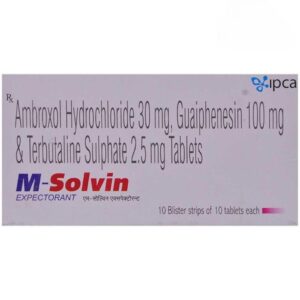AMBROXOL + TERBUTALINE + GUAIFENESIN
Ambroxol: Ambroxol is a medication commonly used as a mucolytic agent in the treatment of respiratory conditions, such as coughs associated with excessive mucus production. It is available in various forms, including tablets, oral solution, and syrup.
The primary mode of action of Ambroxol is its ability to enhance the production and secretion of surfactant in the respiratory tract. Surfactant is a natural substance that plays a crucial role in maintaining proper lung function by reducing the surface tension in the alveoli (small air sacs in the lungs) and promoting the clearance of mucus. By stimulating the production of surfactant, Ambroxol helps to break down and thin the mucus, making it easier to cough up and expel.
The recommended dose of Ambroxol varies depending on the age and condition being treated. For adults and children over 12 years old, the usual dose is 30 mg three times a day. For children aged 6 to 12 years, the recommended dose is 15 mg three times a day. It is important to follow the instructions provided by a healthcare professional or as indicated on the packaging.
While Ambroxol is generally considered safe when used as directed, it may still cause some side effects. Common side effects include gastrointestinal symptoms, such as nausea, vomiting, abdominal pain, and diarrhea. It may also cause a transient increase in bronchial secretion, leading to a temporary increase in coughing. Rarely, allergic reactions, such as skin rashes, angioedema, or anaphylactic shock, may occur. If any unusual or severe side effects are experienced, it is important to seek medical attention immediately.
As with any medication, it is essential to consult a healthcare professional or pharmacist before using Ambroxol, especially if you have any pre-existing medical conditions or are taking other medications, to ensure its safe and effective use.
Terbutaline: Terbutaline is a medication that is commonly prescribed to treat various respiratory conditions such as asthma, chronic obstructive pulmonary disease (COPD), and bronchitis. It belongs to a class of drugs known as beta-2 adrenergic agonists.
Terbutaline works by stimulating the beta-2 adrenergic receptors in the smooth muscles surrounding the airways. This stimulation leads to relaxation of the muscles, resulting in the dilation of the bronchioles and improved airflow to the lungs. It also helps in reducing airway inflammation and mucus production.
The dose of terbutaline can vary depending on the individual’s age, weight, and the severity of their condition. It is available in several forms, including oral tablets, inhalers, and injections.
For asthma treatment, the typical starting dose for adults is 2.5 mg to 5 mg taken orally every 6-8 hours, or 0.5 mg to 1 mg inhaled using an inhaler. For acute asthma attacks or bronchospasms, a higher dose may be required, which can be given through an injection.
Common side effects of terbutaline include headaches, dizziness, tremors, increased heart rate, palpitations, and nervousness. Some individuals may also experience muscle cramps and a low potassium level in the blood. High doses or prolonged use of terbutaline may lead to more serious side effects such as heart arrhythmias, chest pain, and elevated blood pressure.
It is important to note that terbutaline should not be used as a first-line treatment for asthma or other respiratory conditions. It is typically reserved for individuals who do not respond effectively to other medications or for short-term relief of symptoms during acute exacerbations.
As with any medication, it is crucial to consult a healthcare professional before starting terbutaline to determine the appropriate dosage and to be aware of any potential interactions or contraindications with other medications or medical conditions.
Guaifenesin: Guaifenesin, also known by the brand name Mucinex, is an expectorant medication used to relieve chest congestion caused by the common cold, flu, bronchitis, or other respiratory illnesses. It works by thinning and loosening mucus in the airways, making it easier to cough up and clear the lungs.
The recommended dose of guaifenesin for adults and children 12 years of age and older is usually 200-400 mg every 4 hours, not exceeding 2.4 grams in 24 hours. For children 6-12 years of age, the recommended dose is 100-200 mg every 4 hours, not exceeding 1.2 grams in 24 hours. It is important to follow the specific dosing instructions provided by your healthcare provider or as indicated on the product label.
Common side effects of guaifenesin may include dizziness, drowsiness, headache, nausea, vomiting, stomach upset, and rash. These side effects are usually mild and temporary. However, if you experience any severe or persistent side effects, it is important to consult your healthcare provider.
Guaifenesin is generally safe for most individuals, but it may not be suitable for everyone. It is important to inform your healthcare provider about any existing medical conditions, allergies, or medications you are currently taking before using guaifenesin. Additionally, it is always recommended to read and follow the instructions provided on the product packaging for safe and effective use of the medication.

